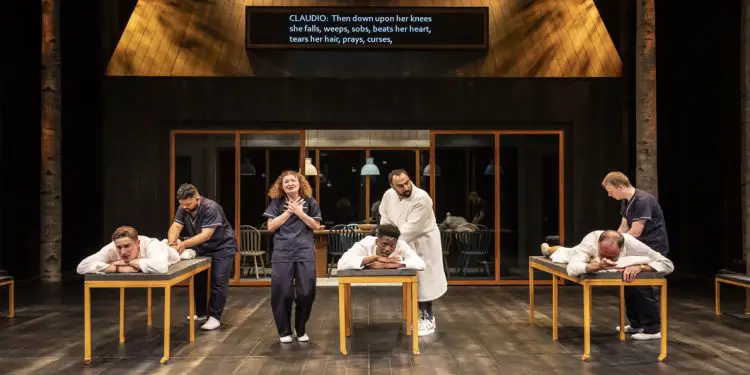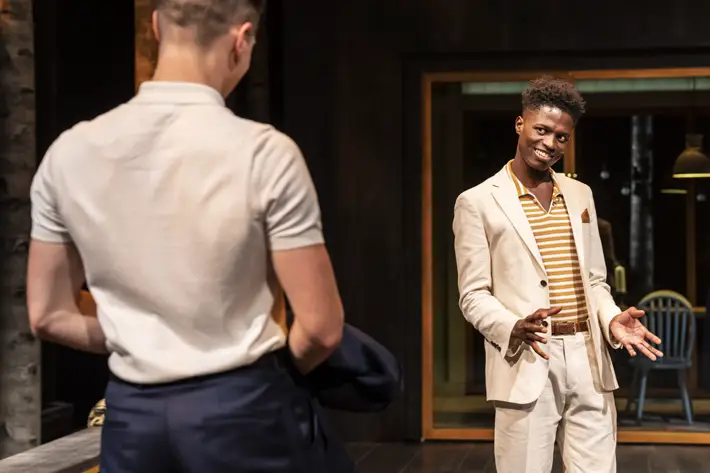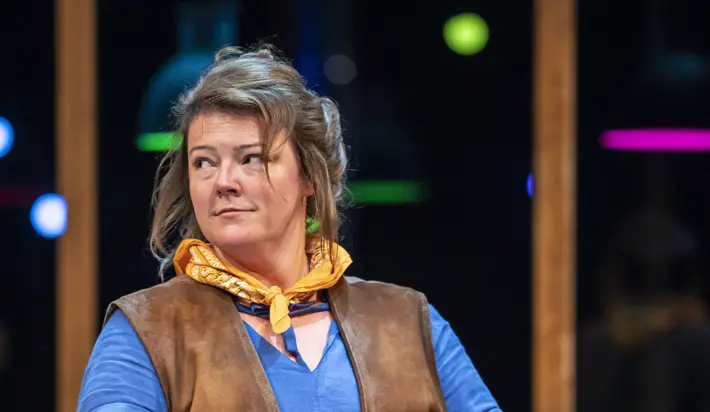Much Ado About Nothing – Review – Sheffield Crucible

By Clare Jenkins, September 2022
Over the last few months, Sheffield theatres have staged a number of productions highlighting the work of deaf, disabled and neurodivergent actors. For starters, at the Lyceum there was the touring Curious Incident of the Dog in the Night-Time – a stunningly inventive, funny, sensitive tour de force. In the Crucible, there was the engaging, intimate, spirit-affirming Human, by Extraordinary Bodies. Then there was Errollyn Wallen’s chamber opera Le Paradis Files, staged by the Graeae theatre company – witty, stylish and exhibiting tight-knit ensemble work.
Sadly, the equally pioneering Ramps Over the Moon’s first attempt at Shakespeare – in collaboration with Sheffield Theatres – is in a lower league. From the moment the 19-strong cast spill out of the glass-fronted room on stage and face the audience, to their let’s-wrap-it-all-up dance at the end, there is a clash of styles, a mishmash of diverse influences, that cloud the clarity of this turbulently romantic play rather than illuminate it.
“Mix of communication”
As in Le Paradis Files, the actors initially come on stage to introduce themselves and their roles. Here, however, because there are so many actors and so many relationships to establish between the characters, the list grows confusing. That confusion isn’t helped by the fact that while some actors are visibly deaf – Claire Wetherall as star-crossed lover Hero, for instance, doesn’t utter a word on set, signing, her words spoken by others throughout – others, like Fatima Niemogha, playing the villainous Donna Joanna, both speak and, at times, use British Sign Language as a fellow actor takes over their lines. This mix of communication styles – live audio description replacing disembodied voices on headsets, captions above and on the stage – can present a challenge for the audience. Are we supposed to be looking at the actress, at her ‘voice’, the signer or the captions?
The captions themselves can be as much a hindrance as a help. Sometimes the onscreen text differs from what’s being said, highlighting the occasional moments when actors forget their lines. However, they do come in useful when the voice is not as well projected or inflected as it could be.
“Distracting elements”
Director Robert Hastie’s intention may well be to challenge expectations, which is what the best theatre ought to do. But there are so many different, distracting elements here, it can be head-swirling. Or, as my late Sheffield mother-in-law would have described it, ‘a right Pippy Show’. It’s not just a case of who are we supposed to be looking at, or listening to? It’s also what period are we in? What world, country, culture, class? Where’s the cohesion, the coherence?
At one point, the whole cast take part in a Wild West hoedown, complete with line dancing and American accents. Late 20th Century ‘vintage’ entertainment seems to loom large, both in the inconsistently styled, yet consistently unstylish clothes (part Sound of Music, part Challenge Anneka) and in the level of comedy. There’s a touch of Frankie Howerd here, a waft of Ken Dodd’s tickling sticks there, a daub of Ab Fab and, for some unknown reason, a couple of plastic ducks stuck like dummies into the mouths of the plotting Borachio (Benjamin Wilson) and Conrade (Ciaran Stewart).
They all come together in the ‘roaring and piping’ double-act of Caroline Parker’s constable Dogberry in pink trouser suit and electric-shock hair and her sidekick Verges (Lee Farrell), the very twittering essence of John Inman in Are You Being Served?.
“Misplaced”
Cheap laughs come a-plenty – the slightest gawp from Taku Mutero as a blank canvas Claudio (Hero’s lover) had the young women next to me shrieking hysterically. But is it really necessary to insert lines about massage beds into Shakespeare, when Claudio and his pals visit a spa on a pre-wedding lads’ night out? Is it really essential to give Benedick the line “Bit top shelf” when he reads his sparring partner Beatrice’s love letter? If the aim is to attract a younger and/or more diverse audience, would they even understand what that means? Is it not enough to trust the play, and its author? To trust the audience and their understanding of nuance? As it is, there are times when the play itself – a comedy of manners (and misogyny) and of social distinctions – is in real danger of getting lost.
Also, by going for so many laughs, it’s not always obvious to spot when the mood dramatically shifts. Nowhere is this starker than when Beatrice instructs Benedick to “Kill Claudio”, after Claudio has jilted Hero at the altar. What should be a heart-stopping, blood-draining moment evoked a completely misplaced roar of laughter from the audience.
Back in Victorian times, the drama critic Arthur Bingham Walkley described the play as ‘a composite picture of the multifarious, seething, fermenting life, the polychromatic phantasmagoria of the Renaissance’. This could well be what Hastie is attempting here – the cast is, after all, multifarious, aka diverse – and the plotline does indeed seethe and ferment. In essence, it’s about two star-crossed romances – that of the resolutely single Beatrice and Benedick and the head-over-heels Claudio and Hero – pulled apart by either their own stubbornness, or by cruel plotters, but brought back together at the last.
“Ball of energy”
Unfortunately, and without at all underestimating the enormity of the task in hand for all those involved, the production stays steadfastly two-dimensional. As Margaret, the boisterous maid who helps convince Claudio of Hero’s unfaithfulness, Laura Goulden is tireless – running, dancing, gurning, talking, signing, audio describing, a ball of energy throughout. Daneka Etchells plays the mouthy, strong-minded Beatrice with a Cumbrian accent, bags of attitude and a rare ability to make Shakespeare sound contemporary. And, as Benedick, Guy Rhys smoothly manages the transformation from witty arrogance to soulful lover. Yet there is little sense of their ‘merry war’ or of any melting softness as they come together at the end. There’s even less chemistry between Claudio and Hero.
Richard P. Peralta comes closest to genuine emotion in the small but significant role of Friar Francis, called in to officiate at the wedding, then to defend the besmirched Hero. For too much of the time, however, it seems as though the cast, committed and energetic as they are, are speaking the words but rarely feeling them with the passion or sincerity they deserve.
‘Much Ado About Nothing’ is on at the Sheffield Crucible until Sat 24th September, before transferring to Leeds Playhouse from Tues 27th September to Saturday 1st October, then on tour













